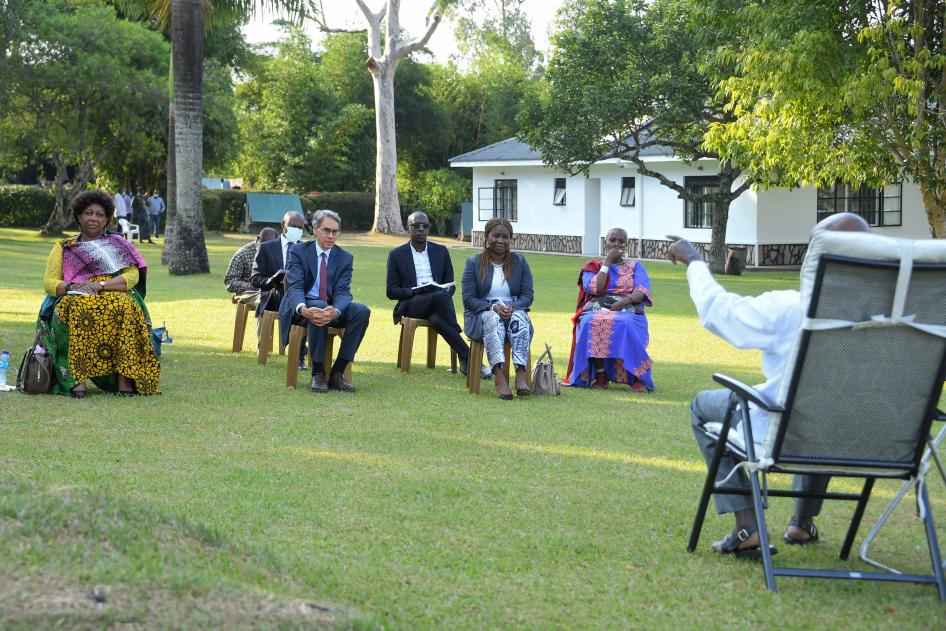(Kampala) – President Yoweri Museveni should accelerate steps toward fulfilling his commitments to end abuses by security forces and restrictions on civil society and journalists in Uganda, Human Rights Watch said following its meeting with him on June 29, 2022. Uganda should hold to account high-level officials responsible for human rights violations and create and respect space for civil society and journalists to operate without interference by the authorities.
“President Museveni’s pledges to improve Uganda’s increasingly repressive human rights record is a positive step,” said Kenneth Roth, executive director of Human Rights Watch. “But they are meaningless as only rhetoric, and he needs to initiate concrete measures to ensure that Ugandan authorities and policies respect and comply with human rights standards.”
During the meeting with Roth and with Mausi Segun, Human Rights Watch Africa director, Human Rights Watch urged President Museveni to ensure that high-level perpetrators of human rights violations – notably Frank “Kaka” Bagyenda, the former director of the domestic intelligence agency, the Internal Security Organization (ISO) – are held to account.
In a March 2022 report, Human Rights Watch exposed cases of enforced disappearances, arbitrary arrests, unlawful detention, torture, rape, extortion, forced labor, and other ill-treatment by the police, army, military intelligence, and the intelligence agency in unlawful places of detention in 2018, 2019, and around the January 2021 general elections. Former detainees told Human Rights Watch that Bagyenda played a central role in their abduction and detention and often personally interacted with detainees.
On October 8, 2020, Museveni fired Bagyenda as head of ISO, but days later in a bizarre twist, asked Parliament to approve him as Uganda’s ambassador to Angola. The appointment was not approved because Bagyenda failed to appear before the appointments committee. Despite the Human Rights Watch report as well as a 2020 report by the Parliament’s human rights committee implicating the agency in the torture and other abuse of detainees in unsanctioned places of detention, the authorities have yet to prosecute Bagyenda or other ISO officials.
During the meeting with Human Rights Watch, Museveni pledged to ensure that Bagyenda is thoroughly investigated and prosecuted for extorting money, appropriating the property of victims of unlawful detentions, and overseeing torture in “safehouses” operated by the agency under his command and control.
President Museveni also pledged to send strong messages to Uganda’s military, the Uganda People’s Defense Forces (UPDF), and other security agencies, that unlawful detention, torture, and other abuses of detainees are unacceptable. He also promised to ensure that those responsible for rights violations within the security forces are prosecuted.
Ahead of the meeting with Museveni, a cross section of civil society and victims’ groups told Human Rights Watch that the authorities have increasingly restricted their work in recent years through a plethora of somewhat confusing legal and regulatory requirements. Museveni promised to address this.
On August 20, 2021, the NGO Bureau, Uganda’s nongovernmental organization regulatory body, announced, without prior notice, that it had halted the activities of 54 civil society groups, including human rights and election monitoring organizations. On June 22, 2022, Museveni announced the restoration of the Democratic Governance Facility, a European Union fund for nongovernmental groups that he suspended in 2021, on the condition that the government is included in its decision-making on the disbursement of funds to Ugandan organizations.
Museveni defended these actions as a reaction to perceived interference by foreign governments in Uganda’s internal affairs through the provision of funding for civil society groups. These same excessive regulations, however, have been used to shut down local groups that receive no foreign funding and those that do vital human rights work. Uganda should immediately end these restrictions, which constitute violations of freedom of association and are abused to harass human rights defenders, Human Rights Watch said.
Museveni also pledged to publicly call on security forces to allow journalists, who play a key human rights role in ensuring a functioning democracy, to do their work unhindered. The police and military have beaten and arbitrarily detained journalists covering Uganda’s opposition leaders’ election campaigns and protests. The authorities have also threatened direct violence against journalists. Among those issuing threats is the police chief, Martin Okoth Ochola, who said at a January 8, 2021 pre-election news conference that “we shall beat you [journalists] for your own sake.”
Uganda’s 1995 Constitution and other domestic laws prohibit arbitrary detention, enforced disappearance, and torture and ill-treatment, including of detainees. The Human Rights (Enforcement) Act of 2019 provides that public officers who commit human rights violations, including both torture and cruel, inhuman, or degrading treatment or punishment, may be held personally liable.
“Museveni has the opportunity to ensure justice for the many victims of human rights violations whose plight has been ignored for years,” Roth said. “Anything less than real security sector reform, alongside the prosecution of government officials implicated in serious abuses, would signify not only Museveni’s tolerance of these abuses, but his complicity.”








